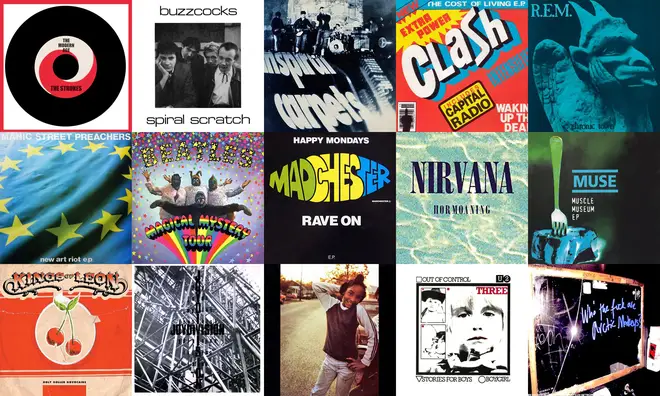On Air Now
The Radio X Indie Night with Rich Wolfenden 7pm - 11pm
26 September 2024, 15:22

It’s like a single… only you get more! Let’s take a look at the finest examples of extended-play goodness…
It was somewhat overshadowed by the PauL Oakenfold 12” remix, but the original EP got the Mondays on Top Of The Pops with Kirsty MacColl. And Clap Your Hands is pleasingly shambolic.

This self-funded (£500), self-released 7” was produced by the legendary Martin “Zero” Hannett and pretty much kick-started the homemade independent music scene in the UK, eventually selling around 16,000 copies. It’s also witty, energetic and typically Mancunian.

The Fab Four had enjoyed a string of best-selling EPs across the 60s, but in the post-Sgt Pepper era, the format was undergoing a decline. They went out with a bang - a DOUBLE EP set designed to showcase the songs from their new TV movie. America couldn’t handle it and compiled an album of the tracks instead.

The first the world heard of KOL, this is a strong set of songs, in their original versions. Was later reissued on nice red vinyl for Record Store Day 2011.

Ostensibly released to plug the track Movin’ On Up, this EP actually includes the title track of the LP Screamadelica, which - at nearly 11 minutes - was too long to fit on the actual album.

Instead of releasing The View From The Afternoon as their third single, Alex Turner decided to chuck out a five-track EP. And the songs are just as strong as the debut album. Nice.

Released between the Give 'Em Enough Rope and London Calling albums, this gave the world the excellent cover of I Fought The Law. Nice artwork too.

Issued between Pablo Honey and The Bends, this EP features outtakes from the sessions for the latter album and came in a variety of different formats, the most common of which is the eight-track CD. It shows the band developing a more challenging sound after the straightforward rock of their debut.

Recorded when they were just plain “Verve”, this was Richard Ashcroft and his band’s first release, featuring material that didn’t show up on an album and features the early space-rock style that the band loved so much.

Before they hit the charts with This Is How It Feels, Clint Boon’s indie heroes released their debut EP on the Playtime label. It gave full rein to the band’s psychedelic 60s roots and includes a cover of the garage rock classic 96 Tears.

Stipe, Buck, Mills and Berry established themselves as America’s most intriguing band with this five-track offering of 60s-style jangle and cryptic lyrics. The buzz generated made the band’s first LP Murmur one of the most keenly-awaited debuts of the era.

When the grunge legends toured Australia and Japan in 1992, the record company released this exclusive EP to arouse a bit of interest. Alongside two original tracks that had already appeared as B-sides, the band covered tracks by Devo, The Wipers and Kurt Cobain favourites The Vaselines, including the live favourite Molly’s Lips.

The ‘2’s very first release, back when they were keen young post-punks in Dublin, trying to sound like Joy Division. Two of the songs later ended up on their debut album Boy, with only Boy-Girl not making the cut.


After their self-titled debut EP, the Teignmouth trio moved closer to the trademark Muse sound with their second outing. Most of the songs later appeared on their debut album Showbiz later that year.
Recorded after the Biff had released their debut single Iname, when Stow College’s Electric Honey label invited them in to lay down tracks for a full EP. Released in June 2000, it’s a fine example of the angry young Biffy. And look where they are now…

Only a measly three tracks, but enough to start a record company bidding war. The songs were re-recored for the debut album Is This It, but this EP is where the buzz began.

Before they turned into the Mancunian behemoth that was Joy Division, these teenage punks recorded this scratchy quartet of punk songs in response to the Buzzcocks’ Spiral Scratch. The songs are pretty raw, the original 7” had awful sound quality and was dressed in a sleeve with some tasteless artwork based on fascist imagery. The 12” reissue was better - and had more cryptic sleeve art.

After the self-funded release of their debut single Suicide Alley in 1988, the original trio were joined by guitarist and lyricist Richey Edwards for this rabble-rousing selection. Got a lot of buzz in the press, as you can imagine.

The second EP by Chris Martin and the boys (following the previous year’s Safety), this one had the original version of the Parachutes album opener Don’t Panic. It was their first release after signing with Parlophone and originally issued in a run of just 5,000 copies.

Jarvis Cocker’s band of misfits had their biggest hit to date with this EP that showcased the classic Babies - a remix of a two year old song. Their next single was Common People.
